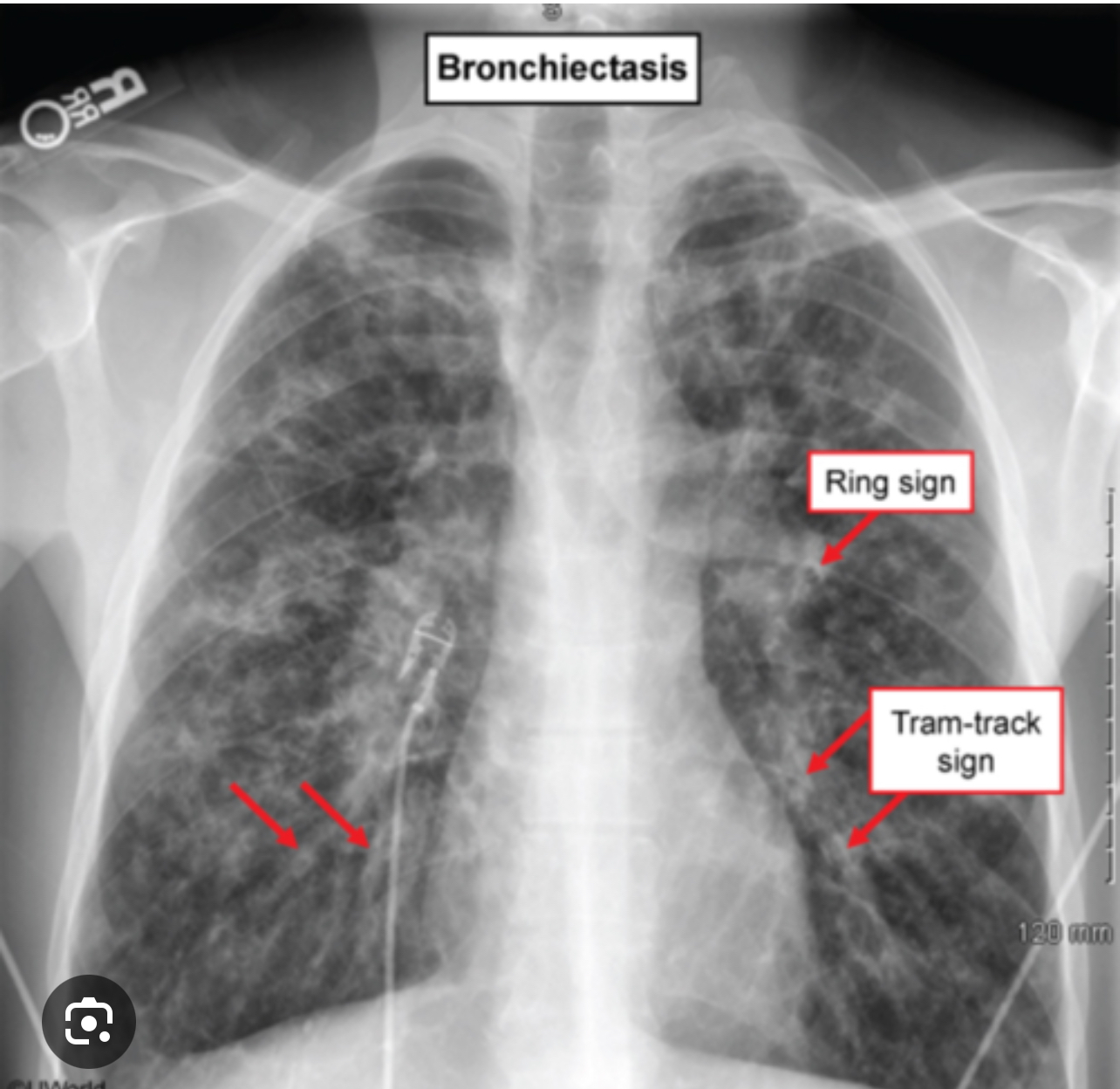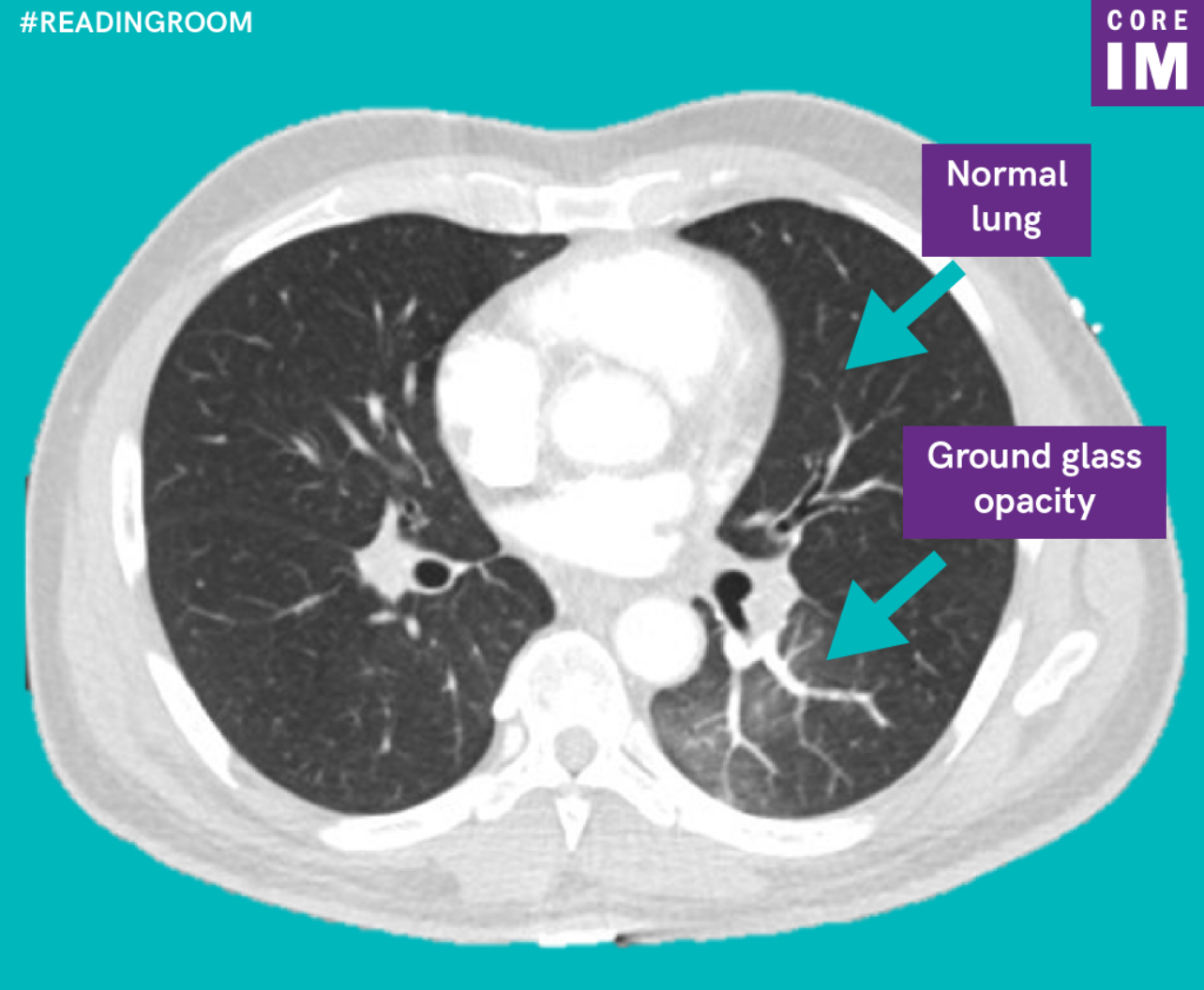Key 1-7 (BE,Treatening Asthma, Mesothelioma, Atlectasis, Pneumothorax)
1/16
There's no tags or description
Looks like no tags are added yet.
Name | Mastery | Learn | Test | Matching | Spaced | Call with Kai |
|---|
No analytics yet
Send a link to your students to track their progress
17 Terms
Bronchiectasis is __________ of airways secondary to(due to)_____ or _______
permanent dilatation
chronic infection or inflammation
most common organism in patient with Bronchiectasis?
Haemophilus influenza(most common)
Pseudomonas auruginosa
Klebsiella spp(all species in klepsiella)
Streptococcus pneumonia
Main feature of Bronchiectasis:
if these suspect BE
Other features on chest xray:
Chronic Persistent Cough +
Copious Excessive Sputum +
Recurrent respiratory tract infection +-
Others: weight loss, clubbing, dullness, crackles
Other features: chest xray:
tramlines(tram track)“cyst/ring opacities”
thick rings
Hemoptysis 1/3 pt

Gold standard to diagnose Bronchiectasis:
HRCT
Bronchial dilatation
Wall thickening with GGO ground glass opacity

Chronic cough in Bronchiectasis may cause______
Hemoptysis
Hemoptysis means coughing up blood from the lungs or airways.
Management for Bronchiectasis
Physical Training (inspiratory muscle training)
Postural Drainage
Antibiotic for exacerbation
Immunisation
Surgery in selected dz(localised dz)
Criteria features for Life Threatening Asthma: must memorise
Altered mental status with drowsiness
Silent chest (no chest sound)
Poor respiratory effort
Exhaustion
Cynosis
Arrhythmia
Hypotension
PEF < 33% predicted or best
Sp02 < 92% (hypoxemia)
Pa02 < 8 kPa
PaCO2 is normal(4.6-6kPa)
Example (1)
A 3yr old boy with asthma presents to the A&E with acute attack of wheeze.
He is drowsy and has cold periphery. His HR is 180bpm, he has intercostal recession and widespread wheeze. What is the most significant feature that shows impending respiratory failure?
A. Cold periphery
B.Drowsiness
C. HR of 180bpm
D. Intercostal recession
E. Widespread wheeze
Example (2)
A 3yr old boy with asthma presents to the A&E with acute attack of wheeze. He is cyanotic and has RR of 45. His HR is 180bpm, he has intercostal recession and widespread wheeze. What is the most significant feature that shows impending respiratory failure?
A. RR of 45
B. Cyanosis
C. HR of 180bpm
D. Intercostal recession
E. Widespread wheeze
Example (3)
A patient recently diagnosed of asthma which has been well controlled, now presents with increase respiratory rate, temp 36.7, auscultation reveals absent breath sound.
Which of the following will indicate life threatening asthma?
Absent breath sound
Increased respiratory rate
Intercoastal recession
Mesothelioma
Bronchial Carcinoma
Name the features to suspect these above conditions
(Question 1)
Hx of being a worker "e.g., builder, a shipyard worker" (exposed to asbestos) [+]
Shortness of breath | Chest pain | Weight loss [+-]
Clubbing, Recurrent Pleural Effusion
what should we suspect?
(Question 3)
A 60 YO retired builder has been having shortness of breath and chest pain for the past 6 months. He is a smoker. His chest x-ray shows mediastinal lymphadenopathy and right-sided pleural effusion. CT scan shows irregular pleural thickening.
Likely Dignosis?
Likely cause?
If he dies, what to do?
The likely Dx →
Mesothelioma.
The likely cause →
Asbestos.
"80% of mesothelioma are due to asbestos".
If he dies →
refer to a coroner.
Mesothelioma
Bronchial Carcinoma
How to confirm diagnosis?
Pleural Biopsy(not cytology)
Malignant Pleural Effusion due to mesothelioma may require:
(Management)
Long term indwelling pleural drain
Mesothelioma is seen in people exposed to asbestos such as:
Blue Collar Workers
firefighters
Construction workers
Power plant workers
Shipyard workers
Other blue collar
Veterans - military
So, it is considered an industrial disease, leading to "unnatural death".
Therefore, deaths of mesothelioma should be reported to and consulted with →
a coroner as compensation is often available.
Atlectasis